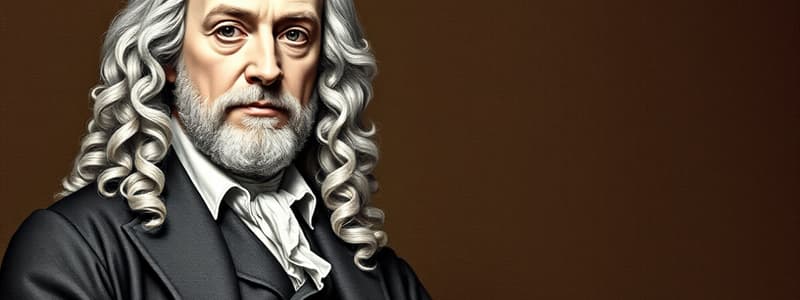Podcast
Questions and Answers
What idea did John Locke advocate for the role of a government?
What idea did John Locke advocate for the role of a government?
Natural rights that belonged to all humans from birth.
Explain the economic policy of laissez faire.
Explain the economic policy of laissez faire.
A policy that allows businesses to operate with little or no government interference.
How did the Enlightenment affect some rulers in Europe, and what are these rulers known as?
How did the Enlightenment affect some rulers in Europe, and what are these rulers known as?
They became known as despots.
How does the Bill of Rights reflect a key Enlightenment idea?
How does the Bill of Rights reflect a key Enlightenment idea?
How did Enlightenment thinkers inspire revolutionaries to push for radical changes in government and society?
How did Enlightenment thinkers inspire revolutionaries to push for radical changes in government and society?
Choose one philosopher from this unit and describe how he or she might respond to a human rights issue that has been in the news recently.
Choose one philosopher from this unit and describe how he or she might respond to a human rights issue that has been in the news recently.
What did Thomas Hobbes believe was the basic nature of human beings?
What did Thomas Hobbes believe was the basic nature of human beings?
What kind of government did Hobbes believe was best for human society?
What kind of government did Hobbes believe was best for human society?
What was John Locke's view of basic human nature?
What was John Locke's view of basic human nature?
What did Locke conclude was the proper kind of government?
What did Locke conclude was the proper kind of government?
Explain the influence of Enlightenment ideas on the United States Constitution and the Bill of Rights.
Explain the influence of Enlightenment ideas on the United States Constitution and the Bill of Rights.
Summarize the reasons why Enlightenment ideas were slow to influence the lives of most Europeans.
Summarize the reasons why Enlightenment ideas were slow to influence the lives of most Europeans.
What did those opposed to Enlightenment ideas do to stop the spread of information?
What did those opposed to Enlightenment ideas do to stop the spread of information?
Identify the roles that censorship and salons played in the spread of new ideas.
Identify the roles that censorship and salons played in the spread of new ideas.
Flashcards are hidden until you start studying
Study Notes
John Locke and Government
- Advocated natural rights inherent to all humans at birth.
- People form governments to protect their natural rights.
- Best government is one with limited power, accepted by citizens.
Economic Policy of Laissez Faire
- Developed by physiocrats as an alternative to mercantilism.
- Promotes minimal government interference in business operations.
Enlightened Despots in Europe
- Frederick II: Advocated religious tolerance, opposed torture.
- Catherine II: Promoted religious tolerance, against torture.
- Joseph II: Sought to understand and amend citizen grievances.
- These rulers were termed as despots due to their autocratic nature.
Bill of Rights and Enlightenment Ideals
- Reflects Enlightenment's emphasis on natural rights.
- Ensures government protection of fundamental rights such as freedom of religion, speech, and press.
Enlightenment Influence on Revolutionaries
- Enlightenment thinkers articulated the need for governments to protect liberties.
- Emphasized concepts of life, liberty, and property as essential rights.
Voltaire's Perspective on Human Rights
- Would oppose modern internet censorship bills for infringing on freedom of speech.
- Believed in the importance of liberty, which he actively defended throughout his life.
Thomas Hobbes' View on Human Nature
- Perceived humans as naturally cruel, greedy, and selfish.
Hobbes' Ideal Government
- Advocated for an absolute monarchy to enforce order and control human behavior.
John Locke's View on Human Nature
- Contrasted Hobbes; saw people as reasonable and moral.
Locke's Ideal Government
- Supported limited government power, natural rights protection, citizen acceptance, and the right to overthrow government.
Influence on the U.S. Constitution and Bill of Rights
- Enlightenment ideas shaped principles of checks and balances, individual freedoms, and democratic governance.
Slow Spread of Enlightenment Ideas
- Primarily affected by widespread illiteracy and the rural lifestyle of the majority of Europeans.
Opposition to Enlightenment Ideas
- Censorship techniques included book banning, burning, and imprisonment to restrict information dissemination.
Role of Censorship and Salons
- Censorship hindered the spread of ideas but led writers to encode messages in fictional works.
- Salons provided a platform for sharing and discussing Enlightenment ideas among the educated elite.
Studying That Suits You
Use AI to generate personalized quizzes and flashcards to suit your learning preferences.



